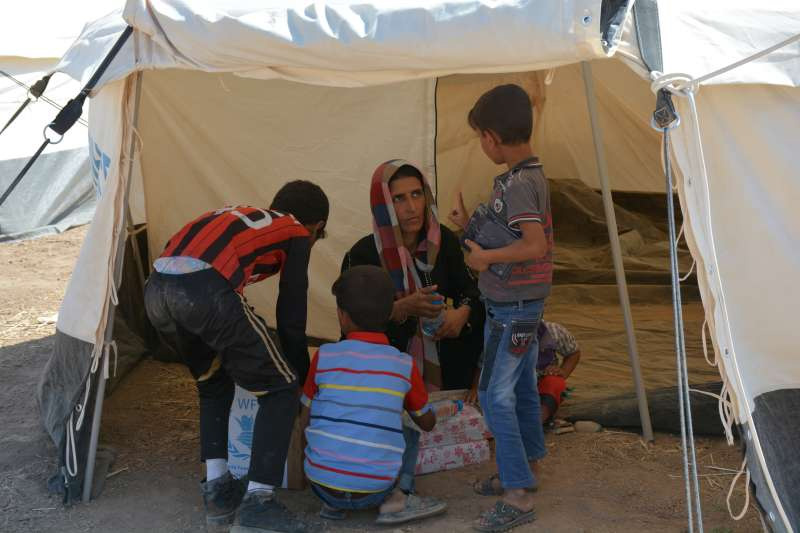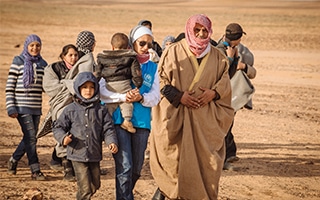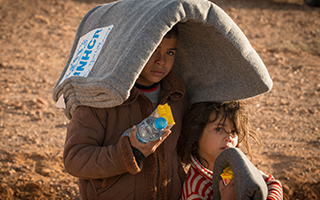Iraq Emergency
For many, this is not their first crisis.
Since the beginning of 2014, more than 3 million Iraqis have been displaced from their homes. Those returning to their areas of origin are facing a number of critical protection issues, living in fear and trapped in regions controlled by violent extremists.
A range of measures have been put in place by UNHCR and Protection Cluster partners to increase protection mechanisms, especially in camps. These include strengthened protection by monitoring and keeping a presence in IDP camps and areas of return; strengthened sexual and gender-based violence (SGBV) prevention and response; and provision of specialized services such as health, legal assistance and access to safe shelter.
Funding is desperately needed for the plight of Iraqis. Response efforts also include the distribution of critical-relief items like blankets, clean drinking water, hygiene kits, sleeping mats and other basic items for survival.
UN High Commissioner for Refugees at Al-Khadra refugee camp, Iraq
million Iraqis have been internally displaced
thousand Iraqis are displaced in informal settlements including unfinished and abandoned buildings
million Iraqis need humanitarian assistance
thousand Iraqis were provided with winter assistance program in 2019
How You Can Help
UNHCR is funded almost entirely by donations from individuals, corporations, and governments. When you support UNHCR’s projects such as the Iraq Emergency Project, you are contributing directly to providing emergency relief to the Iraqis who need it most.
Your donations will help UNHCR provide safe shelter as well as basic survival items such as food, clean drinking water, and medical supplies to the hundreds of thousands of Iraqis driven out of their homes by conflict.
Our Mosul response plan budget is $196 million. If all activities are funded, UNHCR can provide shelter support for over 700,000 people. However we have less than half the funds needed to respond to this emergency. Please help us to ensure these vulnerable families survive.

“There are real fears that the offensive to retake Mosul could produce a humanitarian catastrophe resulting in one of the largest man-made displacement crises in recent years.” – William Spindler, UNHCR Spokesperson
Help us save lives as the Iraq refugee crisis deteriorates
Thousands of Iraqi families are forced to flee their homes every day. With your support, we can give them life-saving care.
The Iraq Emergency
After years of mounting sectarian violence, outbreaks of armed conflict in the Anbar Governorate in January 2014 led to a new widespread displacement of people throughout the country.
In the past three years, this conflict has left millions of Iraqis homeless and in desperate need of food and shelter. Coalition forces are now making significant advances to retake territory from insurgents, and with each territory that is liberated, there will be thousands more civilians who need shelter as they are forced to leave their homes.
“The protection of civilians is the most important element of this operation from our perspective.”
– United Nations High Commissioner for Refugees Filippo Grandi
Helping Iraqi Refugees
UNHCR, the UN refugee agency, is the lead organization providing humanitarian relief for refugees in Iraq. Our agency’s relief efforts include a range of activities from providing emergency shelter and food supplies, to overseeing long-term solutions such as legal assistance for refugee families and psychosocial counseling for children affected by violence.
Since the beginning of the conflict in Iraq, UNHCR has been on the ground providing support to people who have been forced to leave their homes, their possessions, and sometimes even their family members behind. With your help, we can ensure that the families affected by this conflict maintain a sense of hope and dignity, even in the face of the worst conditions.
“There is no better moment than this to be safe in this tent, surrounded by my wife and children.” – Majid, 69 year-old Iraqi grandfather living in Zelikan camp.
In 20-2019, UNHCR:
- Provided winter essentials to 89,480 displaced people in Iraq.
- Provided core relief items to 56,189 Iraqi IDP families and 73,615 IDP families
- Provided one-off cash grants to 441,690 internally displaced Iraqis.
While the situation on the ground is dangerous and complex, we can and must help Iraqis in need today by providing them with emergency supplies, a safe place to stay, and the tools they need to ensure a bright future.
Child Refugees
As refugees, children are often the most vulnerable to hardship and trauma, and this is especially true for children fleeing the Mosul conflict. Some children arriving at UNHCR camps are arriving unaccompanied, and don’t know whether or not their parents are still alive.
These children are arriving after years of living under an oppressive regime where few resources were available and every aspect of life was controlled by force. Access to education in Mosul is rare–children from Mosul district are 30 per cent less likely to have access to education compared to other Iraqi children–and there are even reports of children inside Mosul being beaten or having the wrong haircut or wearing the wrong clothes. At the same time, children from Mosul are also twice as likely to be involved in child marriage compared to other displaced children.
“These children are losing their childhood to displacement. We must ensure that they don’t lose their adulthood because of a lack of education” – Jozef Merkx, UNHCR coordinator in the Kurdistan autonomous region.
Help Us Care for The Children of Iraq
Internally Displaced People (IDPs) in Iraq
With one of the largest internally displaced populations in the world, nearly 1.8 million Iraqis have been forced from their homes fleeing to other parts of the other parts of the country in 2018. This is in addition to the more than 1 million people who fled their homes during the 2006-2008 conflict and have not yet been able to return home.
Help UNHCR provide lifesaving shelter and support for IDPs in Iraq.
Gender Based Violence in Iraq
Displaced populations face an increased risk of gender based violence—and this risk is especially present among those fleeing from occupied territories in Iraq and Syria where women and girls have virtually no protection against sexual violence and discrimination. In particular, displaced Iraqis face increased levels of sexual harassment, forced marriage, intimate partner violence, and honour killings.
UNHCR runs outreach programs to give Iraqi refugees who have experienced gender based violence safe spaces to talk about their experiences and find help. By empowering women and girls, working constructively with men and boys, and actively promoting non-discrimination, UNHCR is working to help all Iraqi refugees fully enjoy their rights to safety and dignity.
Read more about UNHCR’s plans to combat sexual and gender based violence (SGBV) in Iraq.
LEARN MORE
Latest Iraq News
We give you exclusive access to breaking news and information from some of the most remote and hard-to-reach places on Earth.
Yemen Crisis
Yemen is currently the world’s worst humanitarian disaster. Worsening violence is resulting in widespread casualties and massive displacement.
Syria
Daily horrors and devastation at an unimaginable scale makes Syria the largest humanitarian emergency of our era.



